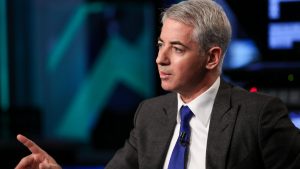When the film The Big Short came out, many viewers thrilled to its gripping storyline, if not its frequent swearing! But the film’s storyline about the 2008 financial crisis also contains practical lessons for me as a private investor, I feel. Here are two that I apply when buying shares for my portfolio.
The importance of timing
In one scene, investor Michael Burry is confronted by an angry investor about the growing cost of a trade that is still in the red. “I might be early, but I’m not wrong.” says Burry. His investor shoots back, “It’s the same thing”.
5 Stocks For Trying To Build Wealth After 50
Markets around the world are reeling from the coronavirus pandemic… and with so many great companies trading at what look to be ‘discount-bin’ prices, now could be the time for savvy investors to snap up some potential bargains.
But whether you’re a newbie investor or a seasoned pro, deciding which stocks to add to your shopping list can be a daunting prospect during such unprecedented times.
Fortunately, The Motley Fool UK analyst team have short-listed five companies that they believe STILL boast significant long-term growth prospects despite the global upheaval…
We’re sharing the names in a special FREE investing report that you can download today. And if you’re 50 or over, we believe these stocks could be a great fit for any well-diversified portfolio.
I do not think being early as an investor is always the same thing as being wrong. But bad timing can definitely make an investment far less attractive even for a long-term investor. Consider Computacenter as an example. Imagine I had looked at the emergence of the internet and decided in early 2000 that increased digital workflows could be good for the company’s share price. I would have been proven right – but not for two decades. That is how long it took the Computacenter share price simply to get back to where it had been in 2000, even though earnings per share had more than quadrupled in the meantime.
So although Burry’s financial analysis turned out to be correct, I think his investor was also correct to emphasise the importance of timing in investment. As the Computacenter example demonstrates, even if being early does not make me wrong about a share, it could come with a high opportunity cost.
Doing the research
There is another scene in The Big Short that I think offers a valuable investment lesson for me as a private investor. When Burry is asked how he knows what is in the complex financial instruments on which his trade depends, he reveals that he read them line by line. That also meets with an incredulous response from his own investor: “You read them? No one reads them. Only the lawyers who put them together read them.”
I think that is true of documents that could affect my shareholdings too. In many cases, few investors will actually take the time to read them in detail. But doing so could reveal crucial information.
For example, I own shares in British American Tobacco. I already realise declining smoking rates could hurt sales and profits in future. But is that the only risk? The company’s most recent annual report devotes no less than 25 pages to a single footnote to BAT’s accounts, entitled “Contingent Liabilities and Financial Commitments”. It details a variety of ongoing risks to the company’s profits, many caused by ongoing litigation. Wading through such detailed information can help me spot red flags as an investor. Just like Burry, in some cases simply taking the time to read publicly available information could help me spot situations where the market has mispriced risk. That could help me spot opportunities as an investor.
Learning from ‘The Big Short’
High finance on Wall Street can seem a long way from being a small shareholder. But I think The Big Short has some useful lessons for me as a private investor. Learning them is a simple, practical way in which I can try to improve my investment returns.
Inflation Is Coming: 3 Shares To Try And Hedge Against Rising Prices
Make no mistake… inflation is coming.
Some people are running scared, but there’s one thing we believe we should avoid doing at all costs when inflation hits… and that’s doing nothing.
Money that just sits in the bank can often lose value each and every year. But to savvy savers and investors, where to consider putting their money is the million-dollar question.
That’s why we’ve put together a brand-new special report that uncovers 3 of our top UK and US share ideas to try and best hedge against inflation…
…because no matter what the economy is doing, a savvy investor will want their money working for them, inflation or not!
Best of all, we’re giving this report away completely FREE today!
Simply click here, enter your email address, and we’ll send it to you right away.
Christopher Ruane owns shares in British American Tobacco. The Motley Fool UK has recommended British American Tobacco. Views expressed on the companies mentioned in this article are those of the writer and therefore may differ from the official recommendations we make in our subscription services such as Share Advisor, Hidden Winners and Pro. Here at The Motley Fool we believe that considering a diverse range of insights makes us better investors.
This post was originally published on Motley Fool






